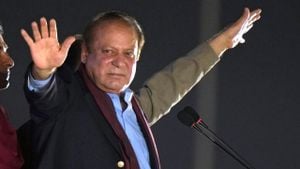Prime Minister Narendra Modi is ramping up his campaign efforts for the upcoming assembly elections in Jharkhand. On November 4th, during a rally in Garhwa, Modi made several announcements aimed at the youth and women of Jharkhand. At the forefront of these promises was the introduction of an unemployment allowance of ₹2000 per month for youngsters if the Bharatiya Janata Party (BJP) wins. This initiative closely mirrors similar schemes seen recently, such as Congress’ ‘Yuva Nidhi’ program introduced in Karnataka.
Modi's promises did not stop there; he also announced the 'Gogo Didi Yojana', which would provide financial aid to women amounting to ₹2,100 each month. On top of this, he pledged to subsidize gas cylinders to sell for ₹500 if the BJP takes control of the state. This move has drawn attention as Modi had criticized similar schemes proposed by rival political parties, branding them as 'freebies' and questioning their long-term viability.
Days before his announcements, Modi criticized Congress' polices, particularly those involving guarantees of employment and financial support. He pointed to the consequences of these guarantees, claiming they led to financial instability across states governed by Congress such as Karnataka and Himachal Pradesh. Modi stated on social media, "Check any state where the Congress has Governments today – Himachal Pradesh, Karnataka and Telangana - the developmental and fiscal health is turning from bad to worse." His rhetoric reflects the BJP's strategy as they gear up for the elections, emphasizing their commitment to not only promises but also delivery.
It’s worth noting the apparent contradiction within the Prime Minister's statements. Earlier, he had been vocal against the pitfalls of making unrealistic promises. Yet, here he was, making very similar commitments himself. Opposition leaders, such as Mehroz Khan from Congress, quickly pounced on this contradiction, accusing Modi of having double standards. Khan remarked on the inconsistency inherent in Modi's approach, showcasing how his previous criticisms clash with his recent pledges.
This dynamic exchange of accusations and promises outlines the competitive political climate as the Jharkhand Assembly elections draw nearer. Modi's bold statements are an integral part of the BJP's strategy to court voters, particularly the youth, who are often seen as key stakeholders shaping the outcome of elections.
The BJP finds itself at this precipice of potential opportunity amid challenges posed by the Jharkhand Mukti Morcha (JMM), led by incumbent Chief Minister Hemant Soren. The JMM now faces scrutiny following Soren's recent controversies, including his arrest, and the defection of seasoned party member Champai Soren to the BJP. These events add layers of complexity to the already fractious political atmosphere.
With poll dates approaching, the question remains whether PM Modi’s promises will successfully capture the electorate's trust. His campaign strategy hinges on the balance of making significant electoral promises, appealing to key demographics, and effectively communicating his vision for Jharkhand's development against the backdrop of growing skepticism among citizens.
The BJP's efforts to position itself as the party of progress and fulfillment will undoubtedly clash with the Congress’ narrative as they rally to highlight fulfillments of their own programs. The assembly elections offer all parties involved the chance to communicate their platforms wider, making transparency and execution of promises more pertinent than ever as voters contemplate their choices at the polls.



